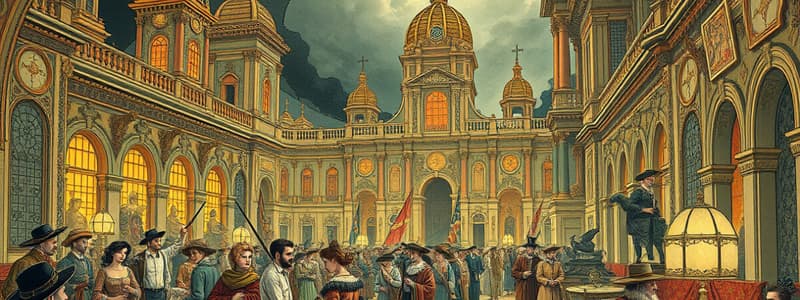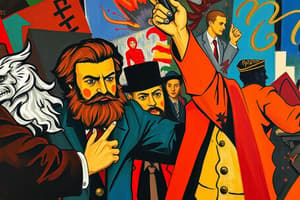Podcast
Questions and Answers
How did Marx see class conflict?
How did Marx see class conflict?
Class is structural, your position defined by means of production. Conflict between different classes.
What is class consciousness?
What is class consciousness?
A person's awareness of being a part of a class and their interests.
What is a classless society?
What is a classless society?
A society where all class conflicts are resolved by the abolition of class. Everyone owns means of production.
How did Weber see class conflict?
How did Weber see class conflict?
What is mode of production?
What is mode of production?
What are class relations according to Marx?
What are class relations according to Marx?
Who are the bourgeoisie?
Who are the bourgeoisie?
Who are the proletariat?
Who are the proletariat?
What is a post-industrial society?
What is a post-industrial society?
What is the petty bourgeoisie?
What is the petty bourgeoisie?
What determines economic class according to Max Weber?
What determines economic class according to Max Weber?
What defines a social status group according to Max Weber?
What defines a social status group according to Max Weber?
What is a political party according to Max Weber?
What is a political party according to Max Weber?
What are privileges?
What are privileges?
What is closure in social context?
What is closure in social context?
What does Gerhard Lenski think of physical force?
What does Gerhard Lenski think of physical force?
What is status inconsistency?
What is status inconsistency?
What is division of labour?
What is division of labour?
What is Taylorism or scientific management?
What is Taylorism or scientific management?
What is deskilling?
What is deskilling?
What are non-standard work arrangements?
What are non-standard work arrangements?
What is monopoly capital?
What is monopoly capital?
What is alienation according to Karl Marx?
What is alienation according to Karl Marx?
What are class interests?
What are class interests?
What is exploitation according to Karl Marx?
What is exploitation according to Karl Marx?
What is the inverse interdependence principle?
What is the inverse interdependence principle?
Flashcards are hidden until you start studying
Study Notes
Class Conflict Concepts
- Class, as defined by Marx, is structural, determined by one's position related to the means of production, leading to conflict between classes.
- Class consciousness refers to an individual's awareness of their class identity and shared interests, highlighted by Terry Clark and Seymour Lipset.
Class Structures
- A classless society exists when all class conflicts are resolved through the elimination of class distinctions, leading to collective ownership of production.
- Weber's view contrasts with Marx by defining class through market situation and resources, suggesting that conflict can occur within the same class.
Economic Frameworks
- The mode of production, as per Karl Marx, describes how society organizes to meet its needs; ownership of the means of production is a source of power and reflects social inequality.
- Class relations involve specific roles within the mode of production, marked by ownership dynamics and the established authority of some over others.
Social Classes
- The bourgeoisie represents the employers who own production means, while the proletariat comprises workers unable to achieve economic independence, relying on wage labor.
- Ralf Dahrendorf identifies post-industrial society, characterized by a shift from industrial production to service-based economies.
Emerging Class Categories
- The petty bourgeoisie is self-employed, occupying a space between the bourgeoisie and proletariat, as noted by Erik Olin Wright.
- Economic class, per Max Weber, is contingent on one's "market situation" and access to property, with social status defined by honor and perceived nobility.
Political and Social Dynamics
- Political parties, according to Max Weber, form when individuals unite based on similar objectives, influencing class dynamics.
- Privileges represent rights or opportunities exclusive to certain groups, like membership to exclusive clubs or marrying into royalty.
Social Closure and Inequality
- Closure, as described by Frank Parkin, restricts access to privileges excluding non-group members, such as men-only clubs.
- Gerhard Lenski posits that physical force, defined as the "power to take life," underpins societal hierarchies and privileges.
Individual Disparities and Work Dynamics
- Status inconsistency manifests when an individual's rank in one system contrasts sharply with another, leading to potential anxiety or radical behavior.
- The division of labor involves the specialization of roles within production processes, contributing to efficiency and necessitating the selling of labor for wages.
Management and Employment Trends
- Taylorism, introduced by Frederick Taylor, strives for ultimate efficiency, resembling machine-like operations in factories, discouraging worker autonomy.
- Deskilling refers to the reduction of skill requirements through technology, diminishing job security for skilled workers.
Employment Structures
- Non-standard work arrangements include low-skill, short-term jobs, often referred to as "McJobs," which typically offer part-time or multiple job opportunities.
- Monopoly capital, a concept by Harry Braverman, describes large corporations that dominate economic landscapes, reducing options for workers and centralizing power.
Psychological and Economic Concepts
- Alienation, defined by Karl Marx, is the disconnect individuals feel from their work and lives, stemming from treating labor merely as a commodity.
- Class interests indicate that the ambitions and needs of individuals stem from their class positions, guiding their rational goals within the class system.
Exploitation and Class Principles
- Exploitation involves the use of power to compel those in weaker positions to provide benefits they would not otherwise concede, often leading to profit at the expense of others.
- Erik Olin Wright's inverse interdependence principle suggests that the well-being of capitalists is tied to the deprivation of workers, emphasizing systemic inequalities.
Studying That Suits You
Use AI to generate personalized quizzes and flashcards to suit your learning preferences.




